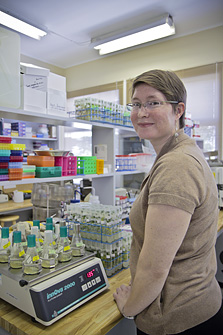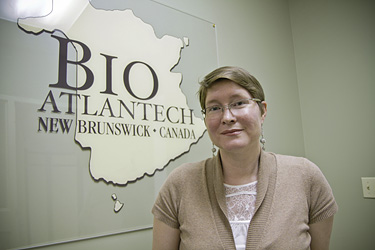Meaghan Seagrave grew up in Moncton and Fredericton and was an active athlete. My passion growing up was always sports, says Seagrave who later went on to complete her undergraduate degree at the University of New Brunswick and graduate degree at the University of British Columbia where she swam on varsity teams at both universities.
My interests were around physiology and human nutrition at the time and that's where I thought my career path was going to go, says Seagrave who now works as a commercialization officer with BioAtlantech in Fredericton. I've worked here just under a year and prior to this position I spent almost 13 years working in the IT industry. Not exactly your typical career path for someone with a science background but looking back, I wouldn't have changed a thing.
When you were growing up, did you ever consider a career in science and technology?
Not really, I was a jock growing up and figured I would do something more directly related to sports.
Why did you decide to pursue a career in science and technology? What or who inspired you?
Initially my interest was in physiology and human nutrition these subjects came very naturally to me and I thought I could easily mix it with my athletic background. I was a little dismayed to learn how monotonous the world of dietetics was and gravitated towards food chemistry (learning what it's made of was far more interesting for me). |

|
What is a commercialization officer?
A commercialization officer helps commercialize new technologies basically, I try to help determine how a technology can make money for the researcher/inventor and ultimately support the economy in New Brunswick. What makes me different from other commercialization officers is that I work with scientific researchers and companies who innovate in the bio space not the IT space.
What kind of education or training is needed to become a commercialization officer?
A background in both science and business development are a must. Having just one or the other is a good start but being able to combine the two will ensure you can understand the science as well as its commercial potential.
What is a typical day at work like for you? What types of tasks/duties does a commercialization officer do?
I help researchers and start-up bio companies with:
- accessing intelligence gathering;
- navigating the plethora of provincial and federal funding resources available;
- assisting with business plan development;
- finding training and networking opportunities;
- helping other agencies understand the new emerging technologies (deciphering the science); and
- helping to find markets for new technologies.
Are there any myths or misconceptions about your job that you'd like to dispel?
Commercializing biosciences is not the same as commercializing computer (IT) technologies. Most people have a greater understanding of technology than bioscience, so there's a need to educate people so they can understand the science. The hurdles for bio based companies are often higher and the road is often longer because it typically involves a lot of R&D but the rewards can be significant and well worth the time and effort.
Do you work with any other women in your field?
There are far more women in science than there were a decade or two ago but I would say that more than 75% of my clients are male or made up of all male teams. In terms of working with other commercialization officers or members of the bio team in the province, we are a pretty good mix.
What are some of the challenges in your job?
Explaining the science in laymen's terms. It is easy to take your education for granted and make the assumption that everyone will understand the terminology. I think the literacy around biosciences is where the literacy around IT was 10-15 years ago. When you talk about the internet, wireless, cloud computing, operating systems, backup or even something simple like a server everyone knows what you are talking about. That wasn't the case 10 years ago. I can't just use terms like somaclonal, baculovirus, biomaterials or orthobiologics without having to explain the term in details to be sure it is understood.
What do you enjoy most about your job? What excites you about going to work every day?
We have amazing researchers and really innovative technologies in this province everyday there are new discoveries and new technologies resulting from those discoveries right here at home. Helping to shine the light on that and show others that this province has a lot going for it makes me want to go to work every day. My job makes it easy for me to be an ambassador for this province.
What kinds of qualities or skills are needed to be a good commercialization officer?
Communication skills are essential. Being able to understand the technology and disseminate it to others then mine your resources to better understand its potential in the local and global marketplace. I never discount any idea that crosses my desk. You just never know if someone's idea could be the next big thing. Having an open mind is important.
What would you say is a personal career achievement you are most proud of?
I don't have one yet.
What advice would you give to others who are interested in pursuing a career in science and technology?
Diversify your professional and educational experience it will give you an advantage and allow you to come to the table with a different view point and the ability to think outside the box when presented with a challenge. It is also a way to broaden your skill set and when working with start-up companies that is key.
What do you believe is the key to success?
Lifelong learning. Get an education you can fall back on and don't take it for granted but don't think it is your only asset - it doesn't define you, it just gives you a starting point in terms of knowledge base. Continue to learn professionally as you move through different paths in your career. Challenge yourself every day and don't be scared to do something outside your comfort zone.
Surround yourself with people you admire and respect and learn as much as you can from them. I had a boss who believed it was important to hire people who he perceived to be smarter than he was he felt there was always someone who knows more about a subject than you do and it's better to have them on your team and contributing to your success than someone else's.
>> Back to Success Stories |

